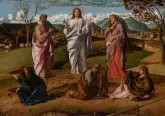Sunday Scripture: The challenge of new ideas
August 14, 2011
By Terrence Callan
Twentieth Sunday in Ordinary Time: Isaiah 56:1, 6-7; Romans 11:13-15, 29-32; Matthew 15:21-28
It can be difficult to give up ideas we have had for a long time and accept new ideas in their place. Admitting that we have been wrong in our past thinking makes us uncertain that our new ideas are any better. But even apart from that, it can simply be hard to change our way of thinking.
The reading from the Gospel according to Matthew tells the story of a Gentile woman, a Canaanite, who asked Jesus to heal her daughter who was being tormented by a demon. At first, Jesus ignored her, telling His disciples, “I was sent only to the lost sheep of the house of Israel.”
But the woman persisted in making her request, and Jesus answered her, “It is not right to take the food of the children and throw it to the dogs.”
Jesus’ mission was focused on the Jews; healing Gentiles had no place in it. The woman refused to accept this. She said, “Even the dogs eat the scraps that fall from the table of their masters.”
Even if Jesus’ mission is to the Jews, there are scraps that can be given to the Gentiles. Jesus was impressed by the woman’s faith and healed her daughter.
This reading shows that there was initially some difficulty accepting that God’s salvation of Israel would also include the Gentiles. Of course, this idea is now very familiar to us, but we can see that this was not true from the beginning. The reading from the Letter of St. Paul to the Romans refers to the surprising fact that the Gentiles who “once disobeyed God” “have now received mercy.”
This was a surprise even though it had been promised in the Old Testament. The reading from the Book of the prophet Isaiah is one example of this. This reading speaks of foreigners who will join themselves to the Lord. They will come to the temple of the Jews, located on God’s holy mountain, and join with the Jews in worshiping God. The sacrifices they offer will be acceptable to God. Therefore, the Jewish temple will be called “a house of prayer for all peoples.”
The reading from Paul’s Letter to the Romans speaks of ideas even more surprising than that of including the Gentiles in salvation. In this reading, Paul is reflecting on the unbelief of those Jews who did not accept Jesus as the Messiah. One might think that this unbelief, what Paul calls “disobedience,” means that they will not participate in the salvation accomplished by Jesus. But Paul rejects this idea. He says, “the gifts and the call of God are irrevocable.”
God’s faithfulness to Israel has not been ended by their unbelief. As Paul says in a part of this passage not included in the reading, ultimately “All Israel will be saved” (Romans 11:26).
The unbelief of some Jews has mysteriously been the means by which Gentiles have been included in God’s salvation of Israel. As Paul says, the Gentiles “have now received mercy because of their [the Jews’] disobedience.”
It is as though the children rejected their food, and that made it possible to throw it to the dogs. And Paul argues, if the unbelief of some Jews has led to this great blessing for the Gentiles, the subsequent belief of these Jews will lead to an even greater blessing — “life from the dead.”
These ideas — that God’s promises to Israel are irrevocable; that the unbelief of some Jews has led to the salvation of the Gentiles; and that the subsequent belief of those Jews will lead to even greater blessings — continue to challenge our thinking.
Callan is a faculty member at the Athenaeum of Ohio.













